Growth characteristics and saponin content of mountain-cultivated ginseng (Panax ginseng C. A. Meyer) according to seed-sowing method suitable for cultivation under forest
IF 2.2
Q2 FORESTRY
引用次数: 2
Abstract
Abstract Mountain-cultivated ginseng (MCG) is a very important health functional material in Korea and the USA. In this study, the growth and saponin of MCG change according to the sowing method were investigated. Six methods of sowing according to the natural cultivation method that grows in the Sancheong mountain ginseng farm were investigated. Germination rate and budding rate were different according to the sowing method. The growth characteristics of the MCG were also different in the sowing method. Among the six sowing methods, the length of leaves was the widest in BFS. The width of the leaves was wide in DFS and DS. The weight of the shoot was the heaviest in BFS, and the DF was the lightest. Root diameter was highest in BFS and DFS covering both fallen leaves and soil. Total fresh weight was the highest at 4.03 g in BFS, followed by DFS. The S/R ratio of DF was lower than that of the other methods. This suggests that the S/R ratio is lowered because the growth of the ground part is worse. The treatment group with the highest crude saponin content was BF and the lowest treatment group was BS. Shoot and root growth tended to increase with growing period, saponin content increased slightly within 1–3 years, but decreased slightly after that. In particular, the ratio of PD/PT, which has a great influence on the efficacy of ginseng, was also different according to the sowing method. The seed sowing method identified in this study will greatly contribute to the improvement of the survival rate decrease over the cultivation period, and it will also contribute to the production of high-quality MCG.适合林下栽培的山参(Panax ginseng C. A. Meyer)播种法的生长特性及皂苷含量
摘要山参在韩国和美国是一种非常重要的保健功能原料。研究了不同播种方式下小麦的生长和皂苷含量的变化。根据山清山人参农场的自然栽培方法,研究了6种播种方法。不同播种方式的种子发芽率和出芽率不同。不同的播种法对MCG的生长特性也有影响。6种播种方式中,BFS的叶片长度最宽。DFS和DS的叶片宽度较宽。幼苗的重量以幼苗最重,幼苗最轻。覆盖落叶和土壤的BFS和DFS根系直径最大。总鲜重以BFS最高,达4.03 g, DFS次之。DF的信噪比低于其他方法。这说明信噪比降低是因为地面部分生长较差。粗皂苷含量最高的处理组为BF,最低的处理组为BS。随着生育期的延长,茎和根的生长有增加的趋势,1 ~ 3年内皂苷含量略有增加,1 ~ 3年后略有下降。特别是对人参功效影响较大的PD/PT比例,也因播种方式的不同而不同。本研究确定的播种法将极大地改善栽培期间成活率下降的情况,也将有助于生产高质量的MCG。
本文章由计算机程序翻译,如有差异,请以英文原文为准。
求助全文
约1分钟内获得全文
求助全文

 求助内容:
求助内容: 应助结果提醒方式:
应助结果提醒方式:


